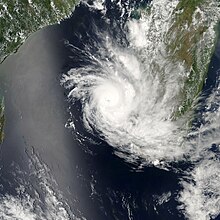 Cyclone Ernest west of Madagascar | |
| Meteorological history | |
|---|---|
| Formed | January 16, 2005 |
| Extratropical | January 24, 2005 |
| Dissipated | January 25, 2005 |
| Intense tropical cyclone | |
| 10-minute sustained (MFR) | |
| Highest winds | 165 km/h (105 mph) |
| Lowest pressure | 950 hPa (mbar); 28.05 inHg |
| Category 3-equivalent tropical cyclone | |
| 1-minute sustained (SSHWS/JTWC) | |
| Highest winds | 185 km/h (115 mph) |
| Lowest pressure | 944 hPa (mbar); 27.88 inHg |
| Overall effects | |
| Fatalities | 78 total |
| Areas affected | Mayotte, Madagascar |
| IBTrACS | |
Part of the 2004–05 South-West Indian Ocean cyclone season | |
Intense Tropical Cyclone Ernest was one of two intense tropical cyclones in the 2004–05 South-West Indian Ocean cyclone season. The eighth tropical disturbance of the season, Ernest formed from a persistent area of thunderstorms in the central Indian Ocean. It initially moved southwestward, intensifying into Tropical Storm Ernest on January 20 while moving into the Mozambique Channel. After hitting Mayotte, the storm quickly intensified to reach peak winds of 165 km/h (105 mph 10 minute winds) off the western coast of Madagascar. Ernest weakened slightly before striking the southwest portion of that country on January 23, producing widespread flooding and gusty winds. The next day the cyclone became extratropical before dissipating on January 25.
On Mayotte, Ernest produced peak wind gusts of 98 km/h (61 mph). The storm drew moisture away from Malawi, causing a nine-day period of dry conditions. A few days after Ernest struck Madagascar, Tropical Storm Felapi affected the same region and produced further flooding. The combined effects of the storms killed 78 people and left over 32,000 homeless. Widespread crop damage sparked food protests, although the World Food Programme provided an emergency supply of rice to affected residents.